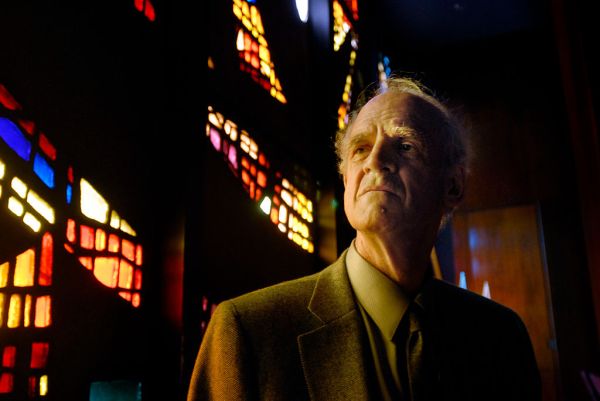Hundreds of people in positions of public service or influence across the nation—from journalists and professors, Capitol Hill staffers and Supreme Court clerks, to even sitting U.S. senators and House members—owe their intellectual formation to classes they took with Robert P. George, the McCormick professor of jurisprudence at Princeton University.
George is a Catholic and social conservative in the belly of the secular-progressive beast. For almost 40 years he has been a scholar and unusually charismatic (and daunting) professor of constitutional law and philosophy of law. He has served on national commissions on bioethics and civil rights. He has trotted the globe to champion the pro-life cause and a strong marriage culture; religious liberty and academic freedom; and civics and civil dialogue. It’s no surprise that the New York Times in 2009 declared him “the most influential conservative Christian thinker.”
This year marks the 30th anniversary of the publication of the book that made his career: Making Men Moral: Civil Liberties and Public Morality, released by Oxford University Press in late 1993. The book got George tenure at Princeton and undergirds many of his later works, but it is especially worth revisiting today to make sense of current debates about the relationship between law and morality—and as a model of how to conduct all our debates.
Making Men Moral charts a middle path between extremes. On the one hand, some liberals or libertarians hope to achieve a morally neutral politics. On the other hand, some on the left and right would too readily curtail civil liberties in the name of their visions of a good society. But George embraces both morality’s proper place in politics and a robust regime of civil liberties. And he does so while modeling rigor, civility, and courage—all in short supply today.
When Making Men Moral was released, academic and popular opinion was dominated by a demand that politics be morally neutral. If you supported certain controversial laws (usually socially conservative ones), you would be accused of “imposing your morality on others.” This objection had intellectual backing and cover from academic giants of the time. Harvard’s John Rawls argued against basing important laws in a pluralistic democracy on any particular philosophical or religious view of the good life. On somewhat related grounds, Oxford’s Ronald Dworkin urged that morals laws—laws banning, say, pornography or prostitution or animal cruelty on the grounds that such acts are morally corrupting—are always unjust.
But in Making Men Moral, George argues that moral neutrality in politics is neither possible nor desirable, and that there is nothing inherently unjust about morals laws. Law often reflects some vision of what the common good of the political community demands. On many issues, the law cannot avoid taking a stand—it will assume one controversial political-moral vision of the common good or another. On abortion, for example, the law will either protect the prenatal life against intentional killing, or it will not. To permit elective abortion at a given stage is to treat the life at that stage as less than a moral person, or to treat the mother’s autonomy as overriding, or both. Prohibiting abortion does the opposite. But this inevitability isn’t a problem, George urges, because the whole point of law is to serve the common good. And, because the common good includes people’s moral integrity, there is nothing inherently wrong with morals laws like bans on pornography or animal cruelty, assuming the banned activities really are morally corrupting (a moral inquiry he leaves for future work). No principle of justice rules out such laws for all times and places.
George grants that laws cannot “make men moral” directly. Someone who avoids a vice just to avoid legal punishment “realizes no moral good,” in his words. But George does hold that morals laws can serve the common good, precisely because moral integrity is an aspect of human wellbeing that can be affected by others’ actions, just as health and safety are. (Thus our legal tradition’s formulation of police powers—the just aims of state action—refers to the protection of health, safety, morals, and the general welfare.) If a “physical environment marred by pollution jeopardizes people’s physical health,” so does “a social environment abounding in vice threaten their moral well-being and integrity.” Each person’s conduct, whether morally upright or corrupt, contributes to a moral culture—“expectations and understandings”—that will make any given form of moral corruption either harder or easier for others to resist. So just as isolated acts of dumping waste can (in the aggregate) harm others’ health, so can individuals’ vices (in the aggregate) harm others’ moral integrity.
Private vice, in other words, has public consequences. If the state may regulate littering to save our physical ecology, George concludes, it may regulate vice to guard our moral ecology.
George qualifies his claim in various ways. He holds that any legitimate role for the state in promoting morals is secondary to that of private parties like “parents, teachers, and pastors,” who “can attend to, understand, and work with individual persons in ways that the law simply cannot.” But even the law’s secondary role may be crucial to making private efforts effective, he argues. Parents trying to prevent their teenagers from consuming pornography, for example, will be stymied if porn is prevalent among most of their children’s friends. George also grants that any given morals law might be unwise to adopt and enforce, either because it is self-defeating (like a law trying to coerce something that must be free, such as friendship), or for contingent reasons. A given law might be so burdensome that it would yield disrespect for the law, or a black market in forbidden goods. Or a broad law banning pornography in the home, for example, might require enforcement powers that would be too easily abused.
Even with these caveats, George anticipated that his account might seem to denigrate core civil liberties. So, he closes Making Men Moral by arguing that the opposite is the case: Basing political principles on a substantive vision of human goods does a better job at justifying robust civil liberties of speech, press, assembly, privacy, and religion than moral-neutralist approaches to politics. By arguing that these liberties are themselves crucial to support people’s pursuit of many human goods, he hopes to illustrate their value, and motivate adherence to them, better than moral-neutralist positions can. To those eager to curb these liberties in the name of substantive justice—on the contemporary left and right alike—the book offers a principled challenge that appeals to their shared conviction that law and policy ought to serve the common good.
At the time that Making Men Moral was published, many in the Princeton politics department, where George was an untenured professor, espoused Rawlsianism. In other words, he staked his tenure case on a book that directly attacked views that then gripped his department and wider profession—when it was the vote of his department and a dozen evaluation letters from the wider profession that would decide his fate. Today, in an age of cancelation and recrimination, intellectual courage of that sort is hard to come by in the academy or elsewhere.
Yet George never gave way to vitriol toward his intellectual opponents, whether Rawls or Dworkin, or the book’s other interlocutors, like Oxford’s Joseph Raz or New York University’s Jeremy Waldron. Making Men Moral summarizes each of their arguments in such a way that, taken in isolation, they seem decisive. Yet George’s responses are powerful enough in their own right that a leading liberal light, Arizona State University’s Jeffrie Murphy, wrote that the book made him “nervous about” his “commitments to liberalism.” It is a lesson for polemicists of all stripes today that Murphy’s reaction arose thanks to, not despite, George’s care in capturing opponents’ arguments.
Indeed, if one ignored the rest of the book, ignored George’s substantive positions, and for that matter had no taste for the topic, one could still benefit from watching the rigor and charity with which he attends to rival views. George seemed to relish, run toward and not away from, the sharpest opponents, those best positioned to do him the favor (as he unironically says) of exposing his errors. To feel that relish, one must love at least one thing more than winning: the truth. There, too, Making Men Moral has renewed importance today.








Please note that we at The Dispatch hold ourselves, our work, and our commenters to a higher standard than other places on the internet. We welcome comments that foster genuine debate or discussion—including comments critical of us or our work—but responses that include ad hominem attacks on fellow Dispatch members or are intended to stoke fear and anger may be moderated.